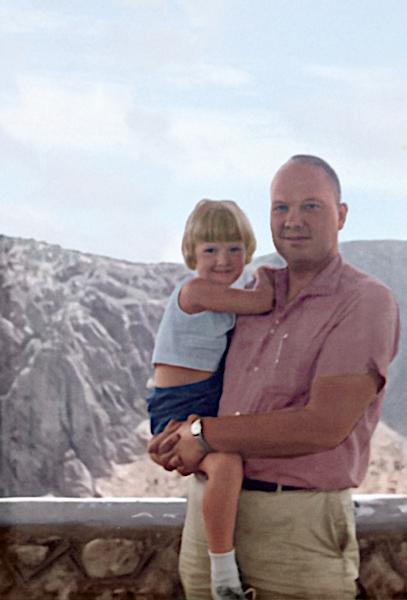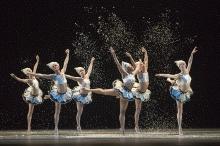Make a Joyful Noise

Ann Meier Baker and her father. Photo courtesy of author.
The holiday season always fills me with childhood memories. My mother was crazy about Christmas, evidenced by her carefully-curated collection of hundreds of unique Christmas ornaments. Mom and I shared a favorite Christmas Carol (“Still, Still, Still”), and even a favorite Christmas hymn descant (David Wilcox’s descant for “Once in Royal David’s City”).
I was the youngest child of five, and my mother—a public school music teacher for 47 years—strongly encouraged all of us to take piano lessons, study a second instrument, sing in the school choir, play in the band, and join the school orchestra. My dad didn’t buy a car with a radio for years saying that, since the whole family sang in the car, we already had all the music we needed. For us, there was always singing, mostly informal and impromptu, and especially during the holidays.
We listened to music too, of course, and once a car radio finally joined our world, we took turns squabbling with my parents about the selection of radio stations. But Mom believed that making music was even better than listening, and so singing together—especially on car trips—usually took precedence over listening, no matter the radio station.
For my dad, however, singing was another matter. He loved to sing like the rest of us, but matching pitch wasn’t his strength. Instead, his contribution to our family singing was to choose one very low pedal tone upon which he intoned the words to the song in rhythm. Like good midwestern Presbyterians-turned-Methodists, we would sing the Doxology in multi-part harmony before sitting down with our extended family for a holiday meal. Dad participated too, by singing one low note for the whole song. (I’m pretty sure that Dad didn’t know that a pedal tone is actually an oft-used technique in music composition. And my father’s pedal tone wasn’t as elegantly executed as it has been by numerous renowned composers over the years, but that wasn’t the point. What mattered was his participation in a beloved communal activity.
Soon after my father’s untimely death more than 30 years ago, we gathered for a holiday meal with the extended family and, like always, sang the Doxology together before dinner. I couldn’t hold back the tears, as the low drone that always accompanied our family’s singing was gone. Some might say that we sounded much better without it, but not me, and I miss it to this day.
At the National Endowment for the Arts, we think a lot about artistic excellence and we endeavor to nurture that excellence through our grantmaking. I embrace that mission wholeheartedly. But I also believe that participating in making art, no matter the maker’s ability, is actually the “secret sauce” when it comes to the arts. Singing in an ensemble with a community of other singers to create an outcome that no one voice can achieve alone is an unparalled joy; writing a poem that captures your feelings can feed the soul in different ways than reading a book of poetry; and getting up to dance to music that begs you to move can replenish your spirit even more than attending a dozen Nutcrackers. Whenever I witness people un-self-consciously creating art, I say a silent thank you to my Mom for encouraging us to make music together—and also to my Dad for modeling whole-hearted participation regardless of talent or training. Isn’t it crazy how often, in retrospect, parents are right about things?
Ann Meier Baker is the NEA Director of Music and Opera.





